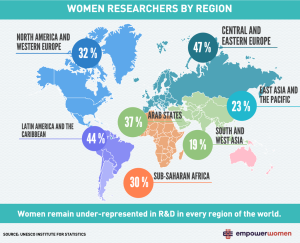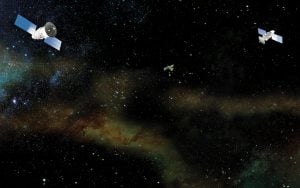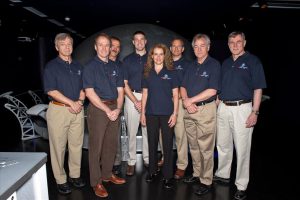
Science & Tech
UN declares International Day of Women in Science
From Roberta Bondar to Harriet Brooks, Canada has more than its fair share of women scientists to be proud of. However women are still a minority in the STEM fields
- 472 words
- 2 minutes
This article is over 5 years old and may contain outdated information.
Science & Tech

There are few things on earth as captivating as the night sky. Yet only a handful of humans have ever ventured off what Carl Sagan called a pale blue dot into that inky beyond. Julie Payette is one of them.
Today marks the 17th anniversary of the Canadian astronaut’s first mission into space. On that mission she was part of the first shuttle crew to dock with the International Space Station (ISS), and became the first Canadian to board the ISS.
Payette was recently named one of Canadian Geographic’s top explorers. Here, she talks about what inspires her and what advice she has for anyone gifted with the irresistible urge to explore.
Who inspired you?
Watching the Americans go to the moon when I was a kid. They went between ‘69 and ’72; I was about 10-years-old. They were showing them on television, and at the time it was an extraordinary feat to watch these people put on a space suit, fly to the moon, drive a jeep around and come back in a small capsule and land with a parachute in the sea. Watching it at school with everybody else, I thought, ‘even though I don’t understand a word of it (because they spoke English and I didn’t), even though they were American and I was Canadian, even though they were guys and I was a girl, and they were all pilots and nobody in my family had never been anywhere close to an airplane, it didn’t matter. I wanted to be an astronaut.’
So from then on it was, “I want to be an astronaut”?
Yeah. I wanted to be an astronaut. And everybody thought that was really funny and totally unobtainable. As I grew older I realized that too. We didn’t even have a Canadian astronaut. Marc Garneau was the first in 1984. I was in my second year of university then. But many of my generation of astronaut were inspired by the Apollo missions, which transcended borders. We didn’t see them as Americans, even though they planted the flag on the moon, they were moon walkers and explorers.
What drives you to explore?
It’s the same exploration drive that fills a good chunk of humanity. By definition we are explorers. We cannot resist walking through a door to find out what’s behind it. We’re curious by nature. We absolutely cannot resist a challenge. We cannot resist pushing out a frontier or exploring a new land, or going higher, or lower, or wider, or faster than anybody else. That’s in the human psyche, I think. Many of us, thank the lord, don’t have it in the same degree because otherwise life wouldn’t work, nothing would run. But it’s a very human characteristic.
What has been your biggest challenge?
Unfortunately, the biggest challenge that applies to women explorers in particular, but not exclusively, is when you’re a minority and you have to cope with many other circumstances around you. We have to figure out how to do it all, and that is very challenging. It would be a challenge for anybody. I used to joke with my colleagues when I flew my second mission in space because all of them had someone who was taking care of everything in the background. To have the freedom to walk out the door in the morning and know that when you come home everything is going to be taken care of with extraordinary competency, while that is really extraordinarily precious. It is a huge challenge when you don’t have that, and I think it’s a challenge that faces women in particular because things are not perfectly equal in our non-equal world.
Is that the same advice you’d give to your younger self?
Toughen up. Tough work. Tough tough tough. You can imagine the hurdles you have in front of you when you are singled out in a group by the fact that you speak a different language, are a different gender and are from a different country. It is always is an adaptation to fit in, especially in a high performance group, but if you are single out by almost every aspect of who you are, you have that many more hurdles in front of you. So I come back to, if you want something, you have to work for it.
What advice would you give to young people who would want to follow you?
Go to school, build a career, be good at that career and then apply to the space program. Today we do have a space program, and there is a possibility for people to apply. In the next few years we’re also going to have a commercial space program. Many companies are working at it, but nobody has flown a commercial space ship with people on board yet, but if not a year, were a few years away from that. So there will be opportunities in the commercial world. Up until now the opportunities were only with government agencies in the countries with space programs. So the odds might not be great, but that’s not a showstopper. So go to school, build a career, find what you’re good at and explore that, and then when the opportunity comes, apply. There are few certainties in life, many things we can’t predict. But I can predict that if you don’t apply for a job that you want you’re not going to get it. If you want something really bad you have to apply and work really hard and do what you got to do and dare to dream.
Are you passionate about Canadian geography?
You can support Canadian Geographic in 3 ways:

Science & Tech
From Roberta Bondar to Harriet Brooks, Canada has more than its fair share of women scientists to be proud of. However women are still a minority in the STEM fields

People & Culture
Payette succeeds David Johnston, who has served in the role since October 2010

Science & Tech
As geotracking technology on our smartphones becomes ever more sophisticated, we’re just beginning to grasps its capabilities (and possible pitfalls)

Exploration
The men and women that have become part of Canada’s space team